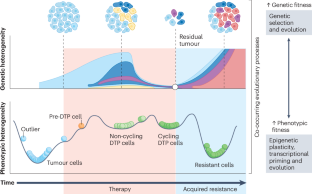Acquired resistance in cancer: towards targeted therapeutic strategies
IF 66.8
1区 医学
Q1 ONCOLOGY
引用次数: 0
Abstract
Development of acquired therapeutic resistance limits the efficacy of cancer treatments and accounts for therapeutic failure in most patients. How resistance arises, varies across cancer types and differs depending on therapeutic modalities is incompletely understood. Novel strategies that address and overcome the various and complex resistance mechanisms necessitate a deep understanding of the underlying dynamics. We are at a crucial time when innovative technologies applied to patient-relevant tumour models have the potential to bridge the gap between fundamental research into mechanisms and timing of acquired resistance and clinical applications that translate these findings into actionable strategies to extend therapy efficacy. Unprecedented spatial and time-resolved high-throughput platforms generate vast amounts of data, from which increasingly complex information can be extracted and analysed through artificial intelligence and machine learning-based approaches. This Roadmap outlines key mechanisms that underlie the acquisition of therapeutic resistance in cancer and explores diverse modelling strategies. Clinically relevant, tractable models of disease and biomarker-driven precision approaches are poised to transform the landscape of acquired therapy resistance in cancer and its clinical management. Here, we propose an integrated strategy that leverages next-generation technologies to dissect the complexities of therapy resistance, shifting the paradigm from reactive management to predictive and proactive prevention. Acquired therapeutic resistance is a key contributor to cancer treatment failure, requiring new approaches to address its complex mechanisms. In this Roadmap, Soragni, Knudsen and colleagues discuss the mechanisms of acquired resistance and the models to better study it. Finally, they promote integration of biomarker-driven strategies and cutting-edge technologies to advance predictive and proactive prevention in cancer therapy.


癌症的获得性耐药:迈向靶向治疗策略
获得性治疗耐药的发展限制了癌症治疗的效果,并导致大多数患者治疗失败。耐药性是如何产生的,因癌症类型而异,因治疗方式而异,目前还不完全清楚。解决和克服各种复杂的抵抗机制的新策略需要对潜在的动力学有深刻的理解。我们正处于一个关键时刻,创新技术应用于与患者相关的肿瘤模型,有可能弥合获得性耐药机制和时间的基础研究与临床应用之间的差距,将这些发现转化为可操作的策略,以延长治疗效果。前所未有的空间和时间分辨率高通量平台产生了大量数据,通过人工智能和基于机器学习的方法可以从中提取和分析越来越复杂的信息。本路线图概述了癌症获得治疗耐药的关键机制,并探索了多种建模策略。临床相关的、可处理的疾病模型和生物标志物驱动的精确方法有望改变癌症获得性治疗耐药及其临床管理的格局。在这里,我们提出了一种综合策略,利用下一代技术来剖析治疗耐药性的复杂性,将范式从被动管理转变为预测和主动预防。
本文章由计算机程序翻译,如有差异,请以英文原文为准。
求助全文
约1分钟内获得全文
求助全文
来源期刊

Nature Reviews Cancer
医学-肿瘤学
CiteScore
111.90
自引率
0.40%
发文量
97
审稿时长
6-12 weeks
期刊介绍:
Nature Reviews Cancer, a part of the Nature Reviews portfolio of journals, aims to be the premier source of reviews and commentaries for the scientific communities it serves. The correct abbreviation for abstracting and indexing purposes is Nat. Rev. Cancer. The international standard serial numbers (ISSN) for Nature Reviews Cancer are 1474-175X (print) and 1474-1768 (online). Unlike other journals, Nature Reviews Cancer does not have an external editorial board. Instead, all editorial decisions are made by a team of full-time professional editors who are PhD-level scientists. The journal publishes Research Highlights, Comments, Reviews, and Perspectives relevant to cancer researchers, ensuring that the articles reach the widest possible audience due to their broad scope.
 求助内容:
求助内容: 应助结果提醒方式:
应助结果提醒方式:


